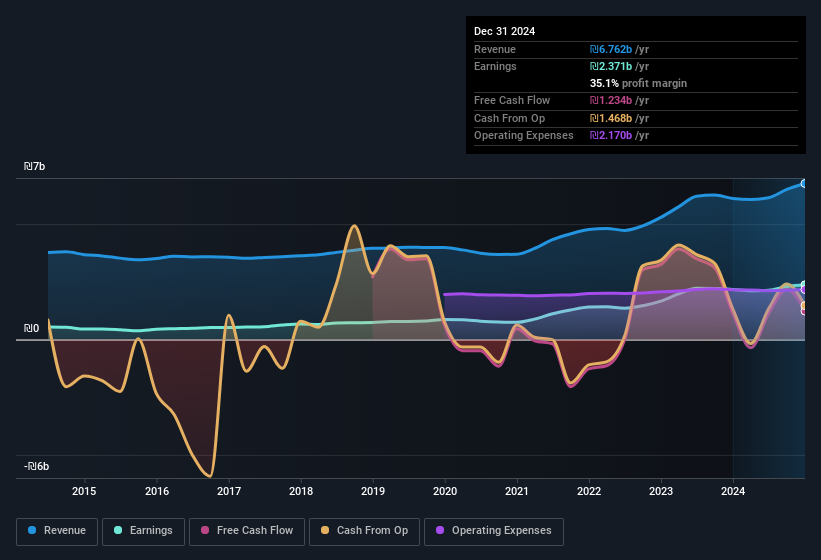Here's Why We Think First International Bank of Israel (TLV:FIBI) Is Well Worth Watching
The excitement of investing in a company that can reverse its fortunes is a big draw for some speculators, so even companies that have no revenue, no profit, and a record of falling short, can manage to find investors. But the reality is that when a company loses money each year, for long enough, its investors will usually take their share of those losses. Loss making companies can act like a sponge for capital - so investors should be cautious that they're not throwing good money after bad.
Despite being in the age of tech-stock blue-sky investing, many investors still adopt a more traditional strategy; buying shares in profitable companies like First International Bank of Israel (TLV:FIBI). Now this is not to say that the company presents the best investment opportunity around, but profitability is a key component to success in business.
We've discovered 1 warning sign about First International Bank of Israel. View them for free.How Quickly Is First International Bank of Israel Increasing Earnings Per Share?
Generally, companies experiencing growth in earnings per share (EPS) should see similar trends in share price. That means EPS growth is considered a real positive by most successful long-term investors. Impressively, First International Bank of Israel has grown EPS by 19% per year, compound, in the last three years. If the company can sustain that sort of growth, we'd expect shareholders to come away satisfied.
One way to double-check a company's growth is to look at how its revenue, and earnings before interest and tax (EBIT) margins are changing. Our analysis has highlighted that First International Bank of Israel's revenue from operations did not account for all of their revenue in the previous 12 months, so our analysis of its margins might not accurately reflect the underlying business. While we note First International Bank of Israel achieved similar EBIT margins to last year, revenue grew by a solid 11% to ₪6.8b. That's a real positive.
The chart below shows how the company's bottom and top lines have progressed over time. Click on the chart to see the exact numbers.

See our latest analysis for First International Bank of Israel
While it's always good to see growing profits, you should always remember that a weak balance sheet could come back to bite. So check First International Bank of Israel's balance sheet strength, before getting too excited.
Are First International Bank of Israel Insiders Aligned With All Shareholders?
Prior to investment, it's always a good idea to check that the management team is paid reasonably. Pay levels around or below the median, can be a sign that shareholder interests are well considered. For companies with market capitalisations between ₪15b and ₪44b, like First International Bank of Israel, the median CEO pay is around ₪6.4m.
The First International Bank of Israel CEO received ₪3.6m in compensation for the year ending December 2024. That comes in below the average for similar sized companies and seems pretty reasonable. CEO compensation is hardly the most important aspect of a company to consider, but when it's reasonable, that gives a little more confidence that leadership are looking out for shareholder interests. It can also be a sign of a culture of integrity, in a broader sense.
Should You Add First International Bank of Israel To Your Watchlist?
For growth investors, First International Bank of Israel's raw rate of earnings growth is a beacon in the night. The fast growth bodes well while the very reasonable CEO pay assists builds some confidence in the board. Based on these factors, this stock may well deserve a spot on your watchlist, or even a little further research. However, before you get too excited we've discovered 1 warning sign for First International Bank of Israel that you should be aware of.
There's always the possibility of doing well buying stocks that are not growing earnings and do not have insiders buying shares. But for those who consider these important metrics, we encourage you to check out companies that do have those features. You can access a tailored list of Israeli companies which have demonstrated growth backed by significant insider holdings.
Please note the insider transactions discussed in this article refer to reportable transactions in the relevant jurisdiction.
Have feedback on this article? Concerned about the content? Get in touch with us directly. Alternatively, email editorial-team (at) simplywallst.com.
This article by Simply Wall St is general in nature. We provide commentary based on historical data and analyst forecasts only using an unbiased methodology and our articles are not intended to be financial advice. It does not constitute a recommendation to buy or sell any stock, and does not take account of your objectives, or your financial situation. We aim to bring you long-term focused analysis driven by fundamental data. Note that our analysis may not factor in the latest price-sensitive company announcements or qualitative material. Simply Wall St has no position in any stocks mentioned.
 Wall Street Journal
Wall Street Journal